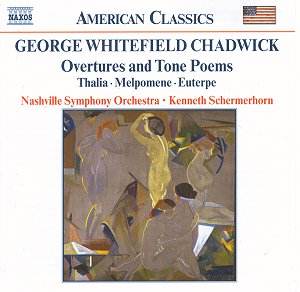The binding theme for three of the pieces of music
on this disc is the Greek Muses or at least three of the seven.
In Euterpe
we have a typical concert overture in the manners of Brahms (Third Symphony),
Schumann (Third Symphony) and DvořŠk (Seventh and Eighth symphonies
and the Scherzo Capriccioso). Just occasionally he kicks
over the traces and we get a more exotic voice (Bantock perhaps) as
at 07.00. The woodwind writing reminded me several times of that of
Zdenek Fibich. Indeed Fibich is not a bad parallel; nor for that matter
is Stanford.
Angel of Death is a tone poem with exuberant
Straussian and Elgarian apparatus - listen to the lilt at 1.20. It is
separated from Euterpe by fifteen years and a world war. By this
time Chadwick was suffering with ill health. He completed the work on
3 January 1918 while young Americans were still dying in the distant
alien dirt of French and Belgian trench-warfare. The last few pages
chart the death of the hero-creator in twilight shudders similar to
those of Strauss's Don Juan wrecked by indulgence racked by a
lost exultant youth now out of reach. The redemptive power of the creatorís
works lives on in the rich peroration.
Aphrodite is another tone poem. This
is the most extended work on the disc. The coordinators of this series
chose well in avoiding the symphonies which have all been recorded before.
This piece does not tell the Aphrodite legend but instead traces the
scenes that might have passed under the blind stone eyes of the myriad
Aphrodite statues placed in sight of the Aegean seas. Intriguingly the
very start soon picks up on a style that Arnold Bax was to use in his
Tintagel. The scenes are: Moonlight on the sea; Storm;
Requiem; The Lovers (solo violin and solo horn); Children
playing; Approach of a Great Army; Hymn to Aphrodite;
Moonlight; Finale. The Lovers is amorously done
and I pay tribute to the soloist (presumably the concertmaster of the
Nashville Symphony). This is a good performance though not superior
to the Serebrier-directed version on Reference Recordings. The two discs
in Serenrier's series with the game Czech National SO are on RR-2104CD
at the price of two for one. If you are at all taken with
Chadwick (and I am) then after you get this disc order the Reference
Recordings set which works out at the same price per disc and in addition
gives you several additional ambitious works.
Melpomene is a tragic overture in which
Chadwick aims for the highest ideals. It can be thought of as having
a family resemblance to works such as Tchaikovsky's Fifth Symphony and
Francesca da Rimini, Schumann's Julius Caesar, Mendelssohn's
Ruy Blas, Beethoven's Egmont and Coriolan. Raw,
protesting, taut and stormy it ends in resigned contemplation. Thalia
was premiered by the Boston Symphony. The comedy of relationships rather
than knockabout is what appears to be reflected here. DvořŠk
and even Smetana put in an appearance and solos for violin and horn
make this the most memorable piece of the five recorded here. There
is a lighter manner about this piece even extending to the frivolity
of castanets in the central section of the overture.
The note-writer claims that his works often show the
snap, the wit and the independence of the American. I am not sure I
detect those qualities. This is music written within a late nineteenth
century romantic vocabulary. Chadwick writes to a style-set of predominantly
German sensibility but with slight softenings from the Russians though
not to the same degree as his Belgian contemporary Adolphe Biarent nor
his British counterpart, Granville Bantock. Edward Burlinghame Hill,
Charles Martin Loeffler, Arthur Farwell and Charles Tomlinson Griffes
were all much more liberated from Germanic models.
The Nashville orchestra make a very creditable job
of these pieces though I can imagine more fluent and polished performances.
I see that this recording was financially supported
by the Aaron Copland Fund. I do hope that the Fund might see its enlightened
way to recording selections of Louis Coerne (especially the tone poem
Excalibur), Arthur Farwell's Rudolph Gott Symphony and
tone poem The Gods of the Mountains, Edgar Stillman's Kelley's
Poe-inspired The Pit and the Pendulum and E.B. Hill's Violin
Concerto.
Rob Barnett


